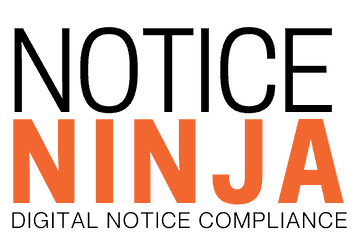Yes, NOTICENINJA is corporate tax notice compliance software that automates key workflows including notice assignments. The platform employs a rule-based system that can manage multiple level rules and ensure notices are directed to the appropriate stakeholder. As a result, you’ll never have to worry about notices being misdirected or slipping between the cracks.

Automate Business Registration Number Searches and Simplify Compliance

27 May
Explaining Business Registration Numbers: Why They Matter for Compliance
Business registration number search is the process of looking up official identifiers assigned to businesses by government agencies for verification and compliance purposes.
If you're tired of juggling EINs, state IDs, and registration requirements across jurisdictions, you're not alone—and you're not stuck. If your tax ops team is still manually searching business registration numbers across dozens of portals, it’s time for a smarter, automated approach.
Here's a quick guide to finding business registration numbers:
| Search Location | What You'll Find | When to Use |
|---|---|---|
| IRS Website | Employer Identification Number (EIN) | Tax verification |
| Secretary of State Offices | State registration numbers | Entity verification |
| SEC EDGAR | CIK numbers for public companies | Investment research |
| Industry-Specific Databases | License/permit numbers | Regulatory compliance |
| International Registries | Country-specific identifiers | Global partnerships |
Every business has numbers. Lots of them. From federal tax IDs to state registration numbers, these digits are the digital fingerprints that verify a company's legitimacy and compliance status. But finding the right number at the right time can feel like searching for a needle in a haystack.
For tax professionals and compliance managers at large corporations, these numbers aren't just data points—they're essential shields against penalties, fraud, and operational disruptions.
Why does this matter for tax operation compliance? When onboarding vendors, expanding into new states, or responding to regulatory inquiries, verifying business registration numbers is your first line of defense. Middesk reports having profiles on over 160 million businesses across the U.S., with most updated within just 10 days—showing how critical fresh registration data has become.
The stakes are even higher now. As of January 1, 2024, many U.S. companies must report beneficial ownership information to FinCEN, adding another compliance layer to an already complex ecosystem.
Whether you're verifying your own company's numbers or conducting due diligence on partners, this guide will walk you through the maze of business registration lookups—saving you time, reducing risk, and ensuring your compliance operations run smoothly.

Explaining Business Registration Numbers
A business registration number (BRN) is like your company's digital fingerprint – unique, traceable, and essential for proving your business's legal existence. These numbers aren't just random digits; they're official identifiers assigned by government agencies that validate your company's right to operate.
Types of Business Registration Numbers
Ever feel like you're drowning in a sea of numbers and acronyms? You're not alone! The business world is full of them, and they vary depending on where you operate.
Your business might juggle several important numbers:
- Your Employer Identification Number (EIN) – that nine-digit number from the IRS (XX-XXXXXXX) that's essential for taxes
- A State Registration Number from your Secretary of State when you formed your business
- Various License or Permit Numbers if you work in regulated industries
- An FTC Registration Number if you deal with textiles, fur, or wool
- A SEC Central Index Key (CIK) if you're filing with the Securities Exchange Commission
- And now, as of 2024, many companies need a FinCEN Beneficial Ownership Information (BOI) filing
These numbers aren't just bureaucratic hoops – they're the backbone of Know Your Business (KYB) procedures and Anti-Money Laundering (AML) compliance efforts worldwide.
Why Every BRN Matters: Compliance, Credibility, KYB
Think of business registration number search as your first line of defense in today's complex business landscape. These numbers do far more than just identify a company – they protect you.
"Before you form a professional relationship with another business, you need to check if it's properly registered to operate," the IRS advises. This simple verification step could save you from partnering with fraudulent entities or facing legal consequences down the road.
When bringing new vendors into your ecosystem, verifying their BRNs is step one in proper risk management. Banks understand this well – they won't even open an account for a business without confirming its registration numbers first.
The landscape is getting even more stringent with the Financial Crimes Enforcement Network (FinCEN) now requiring many U.S. companies to report their beneficial owners – the people who ultimately control or own the business.
How to Perform a Business Registration Number Search Like a Pro
Searching for business registration numbers doesn't have to feel like finding a needle in a haystack. Whether you're double-checking your own company's information or vetting a potential business partner, knowing the right approach can transform this task from frustrating to straightforward.
The secret to successful business registration number searches lies in knowing which registry to check for what information. Different government agencies maintain separate databases, and the freshness of their data can vary dramatically from daily updates to monthly refreshes.
As one compliance expert puts it: "When checking a US business during client or partner onboarding, one simple but crucial question to ask is: is the business properly registered with all applicable levels of government?"
Let's break down how to search like a seasoned pro, starting with your own company.
Business Registration Number Search Step-by-Step for Your Own Company
It's ironic how often businesses misplace their own registration numbers. These critical identifiers tend to get buried in filing cabinets or forgotten in email archives just when you need them most. Here's how to track them down:
First, dust off those formation documents. Your Articles of Organization or Incorporation typically display your state registration number front and center.
Can't find those? No worries. Check your IRS correspondence – specifically the CP-575 notice that arrived when your EIN was assigned. Your tax returns or business tax account statements also contain this information.
Most states now offer business portals where you can log in and view your registration details, status, and upcoming filing requirements all in one place.
Don't forget to check your business licenses and permits for industry-specific registration numbers that may be required for your operations.
If you're using NOTICENINJA for Mastering Tax Notices, you can quickly retrieve these numbers from your digitized document repository without the paper chase.
Here's a tip that will save you countless headaches: Create a simple digital "registration hub" where you store all your business numbers, renewal dates, and associated documentation. This small bit of organization pays enormous dividends when you suddenly need these details for a loan application or vendor verification.
Business Registration Number Search on Another Company
When it comes to checking up on other businesses, public resources and specialized databases become your best friends:
Start with the Secretary of State website for the company's home state. A simple search by business name typically reveals their registration status, formation date, and registered agent information. Some states even let you search directly by registration number if you already have it.
For publicly traded companies, the Electronic Data Gathering, Analysis, and Retrieval (EDGAR) system is a goldmine. Not only can you find their Central Index Key (CIK) number, but you'll also access registration statements, annual reports, and other illuminating filings.
Researching a nonprofit? The IRS Tax-Exempt Organization Search confirms tax-exempt status and provides access to recent filings. Just search by organization name, EIN, or location.
For textile, fur, or wool businesses, the FTC Registration Number Database verifies their assigned RN numbers – a requirement many businesses in these industries overlook.
Advanced Tools & Automation to Scale Searches
Manual lookups quickly become impractical when you're verifying dozens or hundreds of businesses. This is where smart automation becomes essential:
API integrations connect directly to government databases, giving you real-time verification without the manual searching.
Optical Character Recognition (OCR) technology, like the proprietary scan-to-capture system in NOTICENINJA software, automatically extracts registration numbers from documents, eliminating tedious data entry and reducing errors.
Live registry feeds provide regular updates from multiple business registries, alerting you to changes in status without constant manual checking.
Compliance dashboards bring all this information together in one view, highlighting exceptions that need human attention while handling routine verifications automatically.
For organizations that need ongoing verification capabilities, our Tax Notice Resolution Compliance Automation Software – Features provides a comprehensive solution.
Roadblocks, Fees & Data Freshness: What to Watch Out For
Even as business registration searches become more accessible, several challenges remain that can trip up even experienced professionals:
State interface variations can be maddening. Each state maintains its own unique search portal with different fields, capabilities, and quirks. What works in Delaware won't necessarily work in California or New York.
Paywalls and subscriptions create unexpected barriers. Just when you think you've found what you need, some states surprise you with a charge for detailed information or require account creation before proceeding.
Bulk data limitations frustrate large-scale verification efforts. Many registries explicitly prohibit automated scraping or bulk downloads in their terms of service, requiring creative workarounds for high-volume needs.
Update lag introduces uncertainty. As one registry candidly notes: "Each registry is updated periodically," with some refreshing daily while others might update only monthly.
To overcome these problems, consider budgeting for subscription fees where necessary, establishing clear protocols for handling different registry interfaces, implementing regular verification schedules that account for data lag, and potentially partnering with specialists who maintain direct feeds from multiple registries.
Expanding or Hiring in a new state? New Registrations You'll Need
Business growth often triggers new registration requirements that catch even experienced companies by surprise:
State qualification becomes necessary when conducting business outside your formation state. Even minimal activity can trigger the need for a Certificate of Authority in new states.
As one expert notes: "Most LLCs, corporations, partnerships, and nonprofits in the US must register with one or more levels of government." This remains true even if your primary operations stay put but you expand your footprint through hiring or facilities.
Each new state typically requires its own state tax ID numbers, creating a multiplication of registrations to track and maintain.
Workers' compensation numbers must be obtained in nearly every state where you have employees (Texas being the notable exception).
Payroll withholding registrations become necessary in each state where employees reside, even if they work remotely.
Modern nexus considerations go far beyond physical presence. As one expert explained: "State taxation rights ('nexus') can be triggered by a single day of work within state lines." This dramatically expands the registration burden for companies with distributed workforces.
Be aware of "ban-the-box" compliance when hiring in new jurisdictions – thirteen states plus D.C. prohibit asking about criminal history on initial job applications, requiring additional compliance steps.
Many registration processes require a certificate of good standing from your home state, so maintain compliance there even as you expand elsewhere.
The good news? With the right systems in place, managing these registrations becomes much more straightforward – turning a potential compliance headache into a routine part of your growth strategy.
Make Business Registration Compliance Effortless
Managing business registration numbers doesn’t have to be a hassle. With NOTICENINJA, batch entry, automated form-filling, and real-time tracking turn BRN management into a streamlined, reliable process—so you can focus on compliance, not paperwork.
Staying vigilant is perhaps the most crucial lesson. Business registration data isn't static – companies move, restructure, and change status. That vendor you verified last year? Their information might be completely different today. Regular verification isn't just good practice – it's essential protection.
Manual business registration number searches quickly become overwhelming as your company expands into new states or countries. With NOTICENINJA, you can centralize every step—using OCR to capture data, pre-fill forms, and manage renewals or closures—all in one secure, accessible platform. This means less paperwork, fewer errors, and a compliance process that actually keeps up with your growth.
Discover how automation enables fast, accurate registration number retrieval—reducing risk, saving time, and giving your tax and compliance teams complete control.
See how leading tax teams automate BRN management with Notice Ninja—and stay ahead of every compliance requirement.
RELATED POSTS
